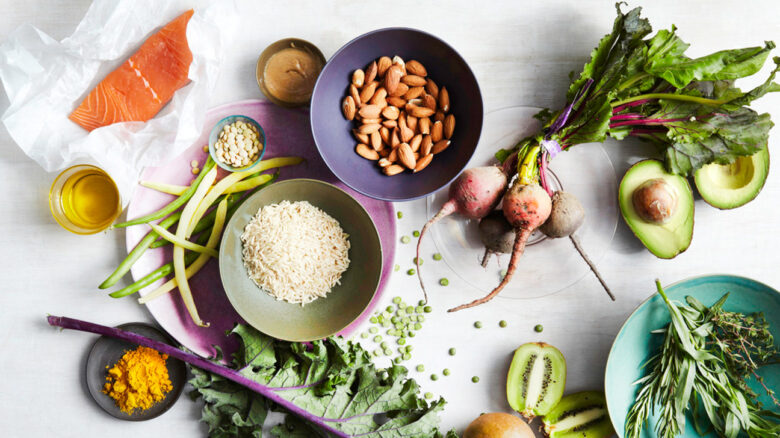Eating a balanced diet can help you feel your best. Be wary of foods high in saturated fat, added salt and sugar that could undermine this goal.
A nutritious diet includes vegetables, fruits, whole grains, lean animal proteins and nuts as part of a well-rounded diet that also limits sweetened drinks, salt and tropical oils – helping prevent disease while supporting weight maintenance.
Eat a Variety of Foods
Diet is essential to overall health and wellbeing; choosing to consume a balanced diet is one of the best lifestyle decisions you can make to improve it.
Choose foods from each of the five main food groups – fruit, vegetables, dairy products, meat and grains. Experiment with different options within each food group while limiting processed junk foods such as sugary drinks, chips and pastries.
Eat five portions of fruit and vegetables each day, whether fresh, frozen, canned or dried; fresh is preferred when juice has been removed from canned. When selecting fruits look for lower sugar options like berries or tropical fruits; dried fruit also works great! For breakfast consider choosing wholegrain low-sugar cereals with semi-skimmed milk and slices of fruit as your breakfast choice.
Eat More Vegetables
An essential component of a balanced diet is eating a wide range of food to get all of the proteins, carbohydrates, fats or lipids and micronutrients your body needs to operate optimally.
Though all vegetables contain various beneficial vitamins, minerals and fiber sources, some varieties boast additional healthful advantages – for instance leafy green vegetables like spinach provide calcium, iron and antioxidants – with leafy green vegetables like Swiss chard having these attributes too!
Diets rich in vegetables may help slow the aging process, reduce heart disease risk, prevent type 2 diabetes, cancer and other chronic diseases and even help improve overall nutrition. To improve your diet try swapping out processed snacks like chips for whole-food options like fruits or vegetables instead. Air Force resources such as registered dietitians and nutrition technicians may provide guidance for eating well.
Eat More Fruits
Produce such as fruits and vegetables provides important vitamins and minerals. Aim for at least five servings of different fruits and vegetables each day for maximum nutritional benefit.
A portion is defined as 80 grams of fruit or vegetables. Try to vary your fruit intake and keep a selection of whole fruits such as apples, bananas and pears ready to eat at home; add dried or sliced fruit like raisins as an addition to breakfast cereal or yogurt for snacking purposes.
Starchy foods may fall prey to crash diets, but they should still play an integral part of a balanced diet. Starches provide slow-release energy while providing valuable sources of fibre, calcium and iron. When selecting whole grain varieties whenever possible to lower the risk of bowel cancer.
Eat Lean Meats
Dieters looking to live a healthy diet should incorporate lean meats as one of their protein sources. These cuts of beef, pork, poultry and fish contain less than 10 grams of total fat per serving and less than 4.5 grams of saturated fat per serving; additionally they should have no more than 95 milligrams of cholesterol in one serving.
Try filling one-fourth of your plate with lean protein foods such as skinless poultry, 95% lean ground beef and pork tenderloin. Grass-fed meat products with reduced levels of saturated fat may help people meet government recommendations regarding maximum saturated fat consumption.
Be mindful when cooking meats that could become tough and dry by overcooking them. Low-fat methods like broiling and baking may provide better results while using herbs, spices or sauces can add flavor while lowering calories overall.
Eat More Whole Grains
One key tip for leading a healthier lifestyle is selecting whole grains over refined ones, as this will lower your risk of obesity, type 2 diabetes, heart disease and cancer as well as other issues.
Whole grains contain abundant amounts of fiber and B vitamins that can support digestive function while managing blood sugar levels more effectively.
Eating whole grains can also help fight inflammation. Refined grains have been shown to raise markers such as C-reactive protein levels, which has been linked with heart disease and other illnesses.
Eat More Nuts
Recent clinical studies suggest that eating nuts may improve your health in multiple ways. While nuts contain fat, most of it is the healthier unsaturated variety; in addition, nuts offer protein, B vitamins and vitamin E which all work to lower cholesterol, triglycerides and insulin levels in your blood.
Nut consumption may contain high calories, yet studies have not demonstrated significant weight gain as a result of their consumption. A handful (30g) of nuts provides 180-225kcal, less than that found in one packet of crisps or 45g bar of chocolate.
According to the Physicians’ Health Study, eating five or more handfuls of nuts per week was linked with an inverse association with incident hypertension. Consider replacing some meat servings with handfuls of nuts on certain days each week.
Drink Water
A balanced diet should include nutrients while being low in sugars, salt, trans fats and saturated fat. When selecting food options to include on a balanced diet plan, opt for whole foods rather than processed ones such as fast food or packaged snacks. Aim to consume three healthy meals each day along with fruit and vegetable-rich water bottles filled with fruit, veggies and water; consider swapping out sugary beverages like soda for non-sweetened low-fat milk beverages or an unsweetened soy beverage; adding fruit slices like lemon/lime zest as well as cucumber can add an extra burst of flavour into the water bottles you drink to give variety and help balance out nutrition needs for health and wellbeing.
Drinking plenty of fluids is essential to maintaining proper body weight, lowering risk of constipation, and supporting healthy skin. Your daily water requirements will depend on factors like age, activity level and medications; more or less may be required than the general recommendation of eight glasses each day. If plain water isn’t your thing, try adding flavor with five calories or less per serving water enhancers instead.




